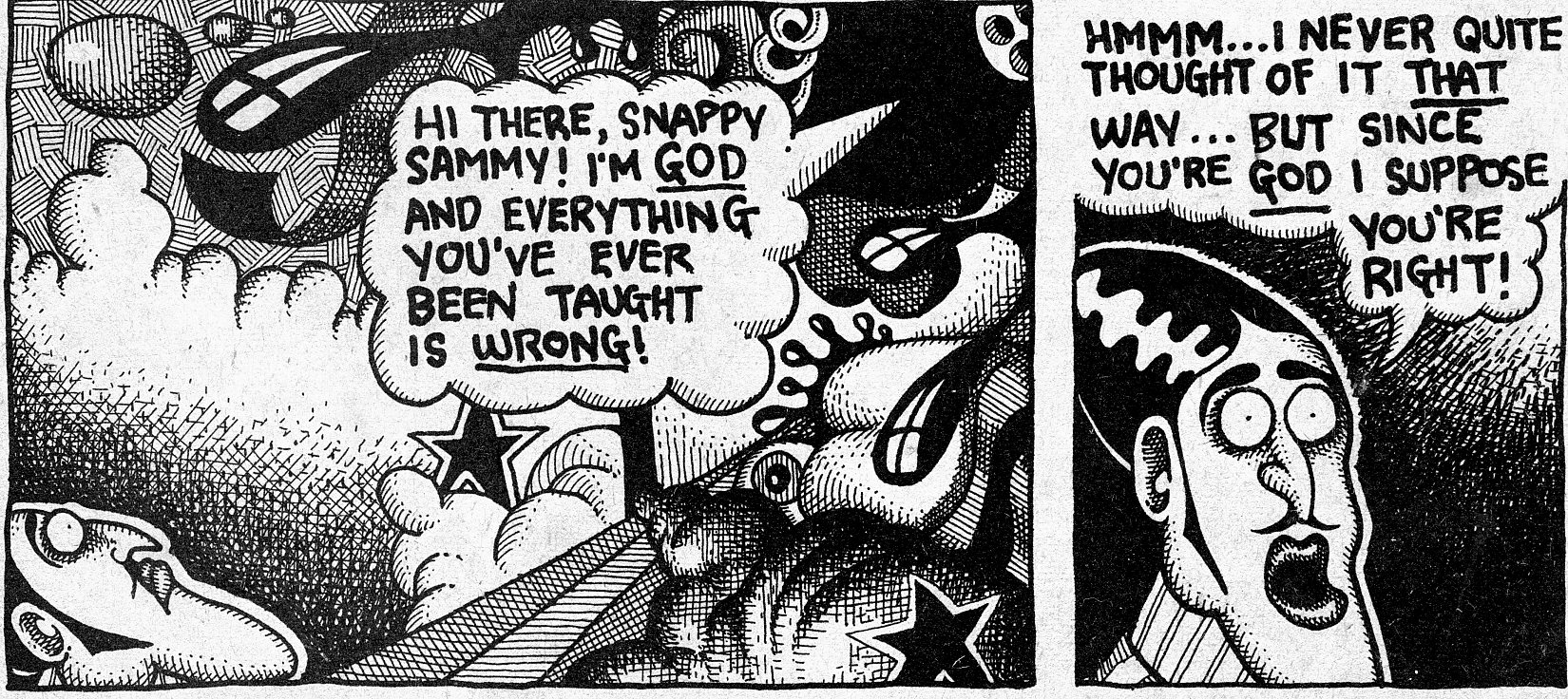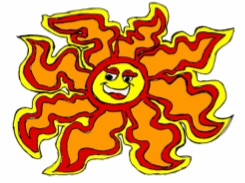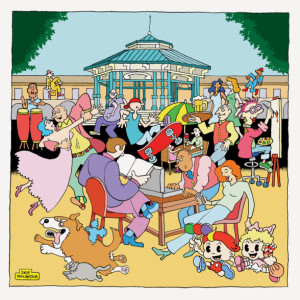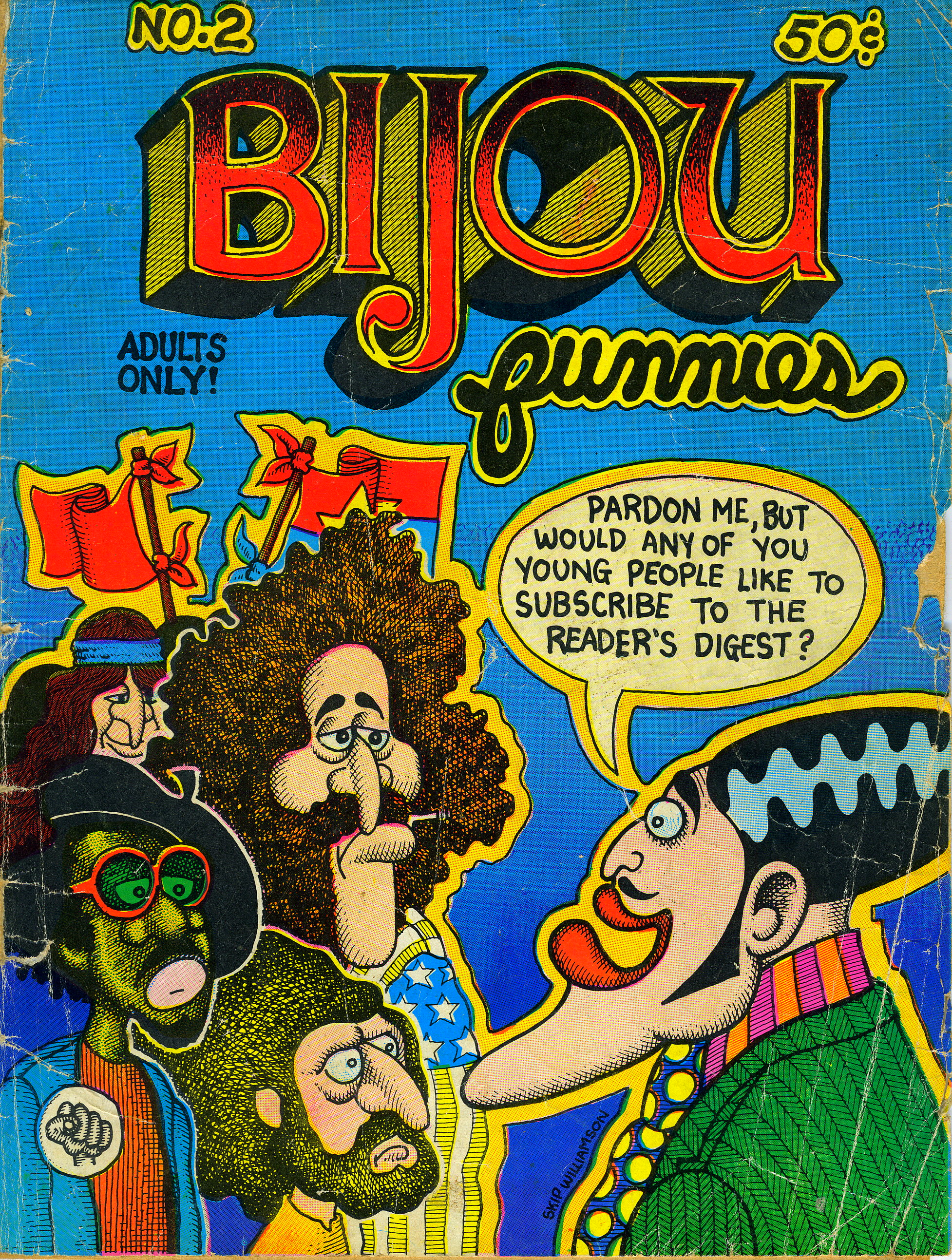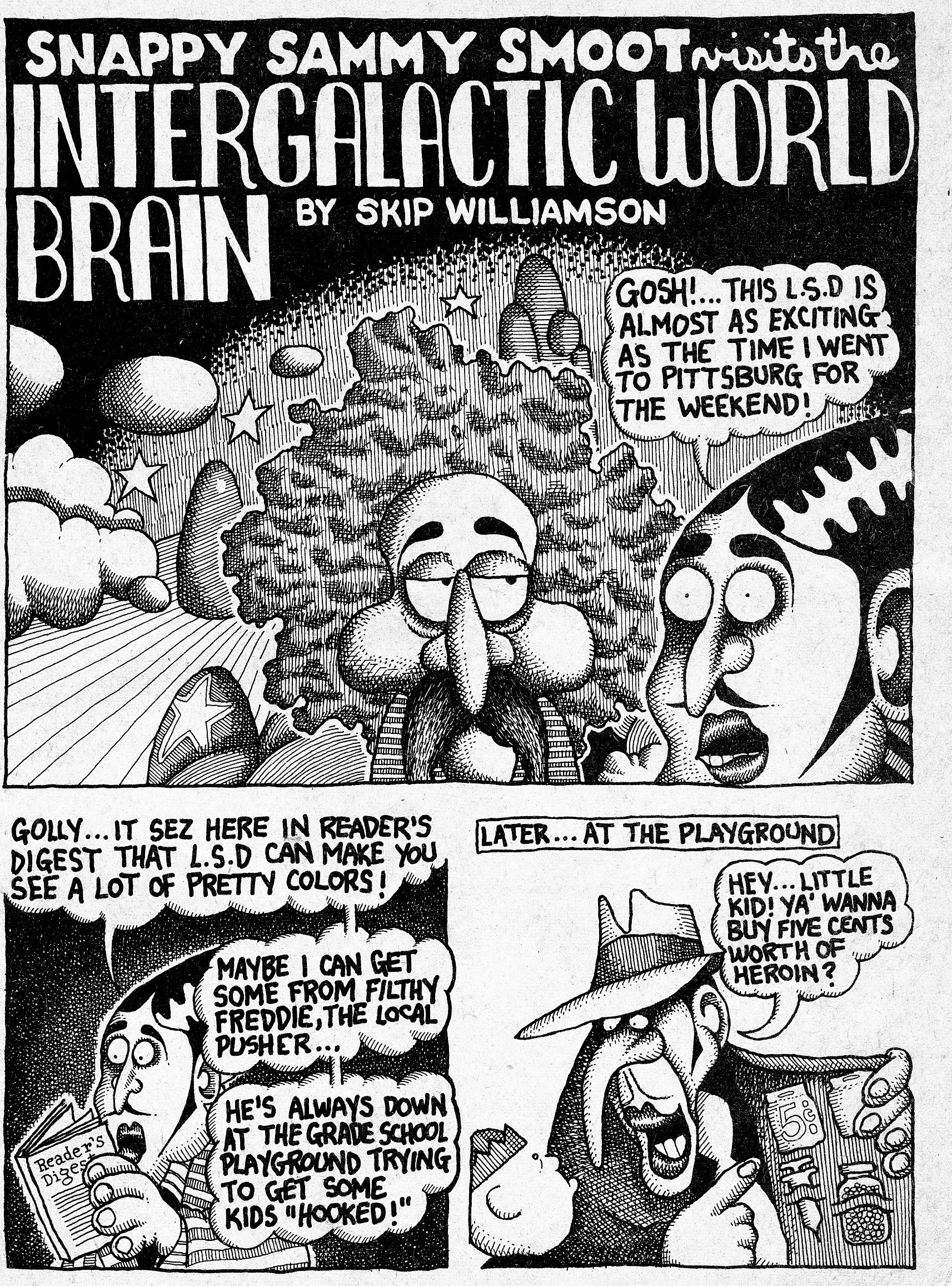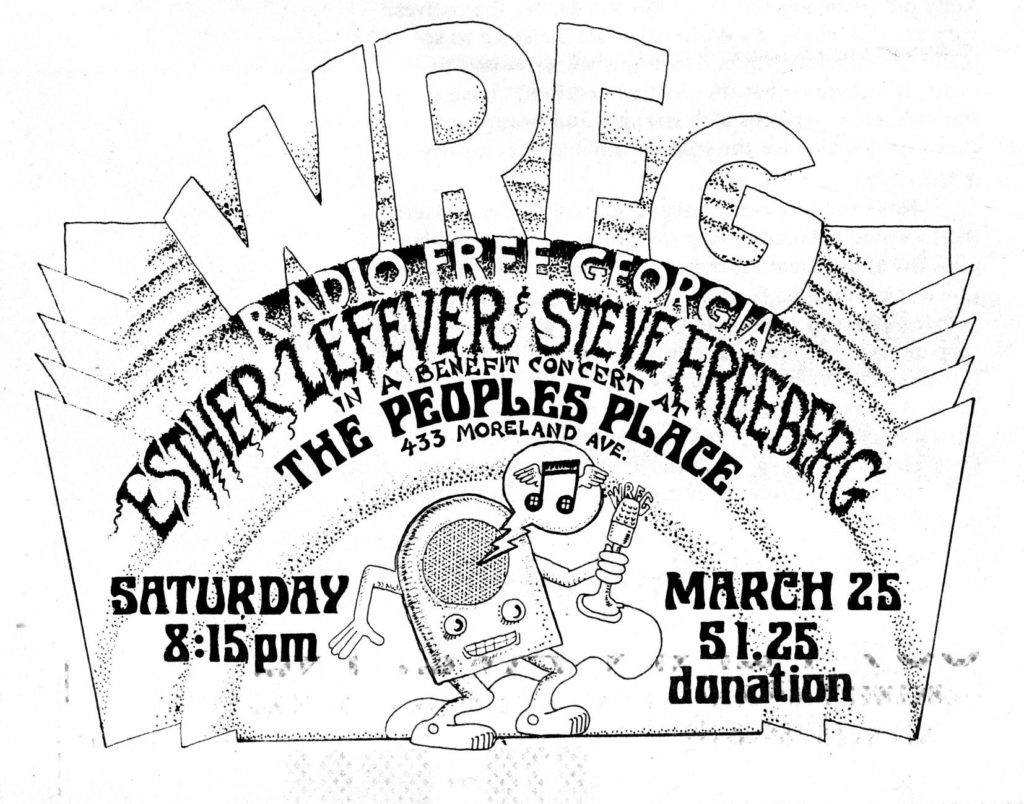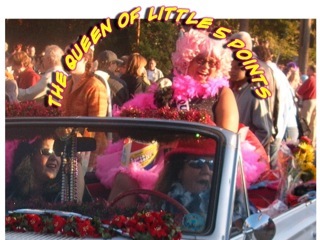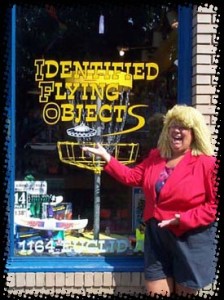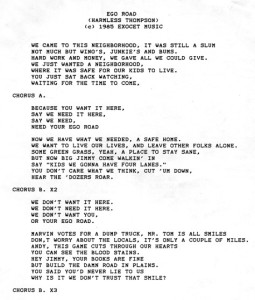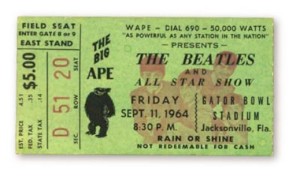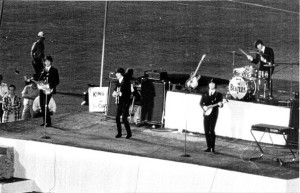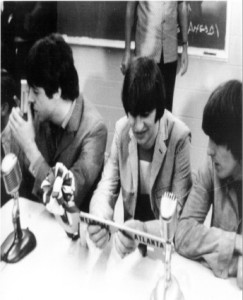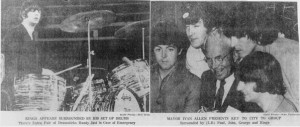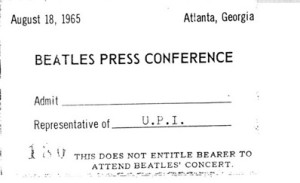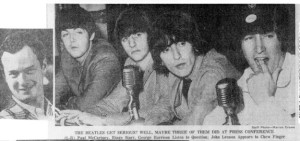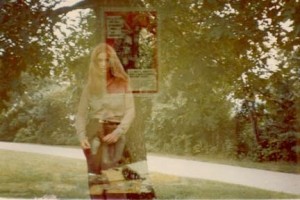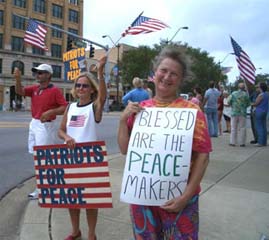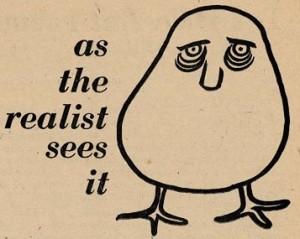 Actually, the Summer of Love in 1967 was born on October 6, 1966, the day that LSD became illegal. In San Francisco, at precisely two o’clock in the afternoon, a cross-fertilization of mass protest and tribal celebration took place, as several hundred individuals simultaneously swallowed tabs of acid while the police stood by helplessly. Internal possession was not against the law. The CIA had originally envisioned using LSD as a means of control, but millions of young people became explorers of their own inner space. Acid was serving as a vehicle to help deprogram themselves from a civilization of insane priorities. The nuclear family was exploding. Extended families were developing into an alternative society.
Actually, the Summer of Love in 1967 was born on October 6, 1966, the day that LSD became illegal. In San Francisco, at precisely two o’clock in the afternoon, a cross-fertilization of mass protest and tribal celebration took place, as several hundred individuals simultaneously swallowed tabs of acid while the police stood by helplessly. Internal possession was not against the law. The CIA had originally envisioned using LSD as a means of control, but millions of young people became explorers of their own inner space. Acid was serving as a vehicle to help deprogram themselves from a civilization of insane priorities. The nuclear family was exploding. Extended families were developing into an alternative society.
There had always been a spirit of counterculture, taking different forms along the way. Just as the beats had evolved from the bohemians, the hippies were now evolving from the beats. No longer did you have to feel like the only Martian on your block. There were subcommunities developing across the country. “Make love, not war” had become more than a simple slogan. The banning of LSD also affected Bay Area underground papers. The political Berkeley Barb got psychedelicized and the psychedelic San Francisco Oracle got politicized. The CIA’s scenario had backfired.
The blossoming of the flower children–encompassing sex, drugs and rock’n’roll–was at its core a spiritual revolution, with religions of repression being replaced by religions of liberation, where psychotropic drugs became a sacrament, sensuality developed into exquisite forms of personal art, and the way you lived your daily life demonstrated the heartbeat of your politics. There was an epidemic of idealism. Altruism became the highest form of selfishness.
Greek philosopher Socrates said, “Know thyself.” Novelist Norman Mailer said, “Be thyself.” And the ’60s counterculture said, “Change thyself.” Comedian George Carlin–who had entered show biz in the late ’50s, wearing a suit and tie, performing traditional stand-up schtick–started surfing on that wave. He reinvented himself visually–jeans, T-shirt, beard, ponytail–and acknowledges that smoking marijuana really helped him to fine-tune his material.
“My comedy changed because my life changed,” he says. “The act followed what was going on in me. Humor is very subjective, and what I was doing on stage didn’t match up with what was going on in my life or the country–1967 was the Summer of Love, it was the height of the cultural revolution–love, peace, free sex, all crested that summer. Everything was changing. I was playing big shows like Jack Paar and Ed Sullivan, but inside I was anti-authority and I hated that shit. Parents might not have been able to relate, so I went to the kids. I was using my act to further my ideas about the times.”
The mainstream media began to catch up with a whole new generation of pioneers traveling westward without killing a single Indian along the way. San Francisco became the focus of this pilgrimage. On Haight Street, runaway youngsters–refugees from their own famlies–stood outside a special tourist bus–guided by a driver “trained in sociological significance”–and they held mirrors up to the cameras pointing at them from the bus windows, so that the tourists would get photos of themselves trying to take photos of hippies. When Time magazine decided to do a cover story on hippies, a cable to their San Francisco bureau instructed researchers to “go at the description and delineation of the subculture as if you were studying the Samoans or the Trobriand Islanders.”
This was at a time when a rumor that you could get legally high from smoking dried banana skins was eagerly spread across the country. In San Francisco, there was a banana smoke-in, and an entrepreneur started a successful banana-powder mail-order business, charging $5 an ounce. Agents from the Bureau of Narcotics and Dangerous Drugs headed for their own laboratory, faithfully cooking, scraping and grinding thirty pounds of bananas, following a recipe published by the underground weeklies. For three weeks the FDA utilized apparatus that “smoked” the dried banana peels. The Los Angeles Free Press promoted another hallucinogenic–pickled jalapeno peppers, anally inserted. All over southern California, heads were shoving vegetables up their asses. After I mentioned on stage that the next big drug would be FDA, sure enough, Time reported that there would be “a super-hallucinogen called FDA.” Silly me, I thought I had made that up.
And then there was Newsweek. Kate Coleman, who, before graduating from UC-Berkeley, was busted at a sit-in by the Free Speech Movement, got a job there in New York.
“In the summer of 1967,” she recalls, “Newsweek indirectly bought enough grass and paraphernalia to warrant a felony sentence in New York of one to 15 years. Only three years behind the times, it was decided to do a cover story on marijuana, and naturally I was assigned to the story. I went down to the Lower East Side’s Psychedelicatessen and purchased two beautiful water pipes, a hash pipe, roach holders, a dozen packets of cigarette papers, and a few little psychedelic toys. What a haul!
“I also bought two ounces of Acapulco Gold and one ounce of Panama Red from my favorite exclusive downtown dealer. Newsweek footed the whole bill without a ripple, and I got the payola of a lifetime. But it didn’t end there. The fact that marijuana was to be legitimized twixt the pages of Newsweek gave rise to unexpected curiosity on the part of both the senior editor and the writer of the piece, both of whom decided, independent of each other, that their respective editing and writing would lack verisimilitude unless they tried the stuff. I was approached by people all over the magazine, asking me to get them some pot.”
A highlight of the Summer of Love for me was an acid trip at the 1967 Expo in Montreal. I had been invited to speak at the Youth Pavilion and also to give my impressions, on Canadian TV, of the United States Pavilion, a huge geodesic dome engineered by Buckminster Fuller. Before entering the U.S. pavilion, which was guarded by marines who had attended a special Protocol School, I ingested a 300-microgram tab of LSD.
“This pavilion is really beautiful, with all these flowing colors,” I said to the interviewer. “You don’t see them, but I do. There’s an interesting kind of symbolism, though. These military men, combat marines, I don’t see that in any other pavilion, military men guiding you around, saying, ‘Yes, there’s the Little Girls room’ or ‘Would you like to touch my medals for killing Viet Cong?’ I think it’s very appropriate that we should be standing right here by the largest escalator in the western hemisphere, since my country is the greatest escalator of the war in southeast Asia….What I would like to do, as a gesture of my commitment–since I feel there’s something lacking in the American Pavilion, which is a certain recognition of the fact that the country is really split in two–since we’re a nation of symbols, I would like to indulge in a symbolic act. I have my draft card here.”
“You’re kidding.”
“Would I kid about a thing like that?”
“It’s his draft card.”
(It was really a photostat of my draft card, since I burned one each time I was invited to speak at a college campus.)
“And I’ll hold a match here.”
“Are you sure you know what you’re doing?”
“If I may.”
“He’s burning his draft card. How about that for a scoop, hey?”
“Now, the reason I’m doing this is, again, because we get hung up on symbols. People will be more upset about this than about the fact that children are being burned alive in Vietnam….”
The marine lieutenant called his captain. When the interview was finished, the captain told me it was against the law to burn my draft card. So I took out my draft card and showed it to him.
“But he burned it,” the lieutenant insisted. “I saw him, sir. He burned it.”
“I burned a photostat of my draft card. So I lied on television. That’s not a crime. People do it all the time.”
“It’s also against the law to make a copy of your draft card,” the captain said.
“Well, I destroyed the evidence.”
I knew that political demonstrations were barred at Expo, but I had managed to smuggle one in, along with the acid. The interview was labeled an “incident,” and there was a heated argument between the U.S. Information Agency and the Canadian Broadcasting Company, but the incident was already on tape, so now it had become a free-speech issue. It would be shown on TV that night and become front-page news in Montreal papers the next day.
Just as I was leaving the pavilion, a band struck up a fanfare. I made the mistake of projecting my own feelings, and suddenly I was convinced that LSD had been sprayed into the air, that everybody was tripping, that peace and love were breaking out all over the world at that very moment. As I was walking along, I started smiling at families and waving to them, and they were smiling at me and waving back. But then a core of reality came to the surface, the force of my own feedback made me turn around, and I saw that those same people were now pointing at me. What an asshole! I still blush with embarrassment.
Now, a non-profit organization, the Council of Light, has organized a free 40th Anniversary all-day concert to be held at Golden Gate Park on September 2 “intended to not only celebrate the music, but also resonate with the consciousness raising of the ’60s as represented by eight goals chosen to receive donations and publicity from the concert. They are: Environmental Sustainability, Relieve Poverty & Hunger, Raise Education, Promote Gender Equality, Reduce Child Mortality, Improve Maternal Health, Combat AIDS, and create a Global Partnership for Development in undeveloped nations. Charities chosen by the Council representing these eight goals will receive all money raised beyond basic costs of the production.”
For information, check out summeroflove40th@yahoo.com. But you don’t have to be present at the concert to celebrate this phenomenon that occurred four decades ago–an evolutionary jump in consciousness–exploding out of the blandness and repression of the Eisenhower-Nixon years. Currently, a mass awakening, exploding out of the blandness and repression of the Bush-Cheney years, seems to be happening again. Or is that just wishful thinking?
* * *I asked several folks to recollect an aspect of what the Summer of Love meant to them.
Stephen Gaskin–author of Cannabis Spirituality: When the Human Be-In of January 1967 at Golden Gate Park was conceived, it was against the background of sit-in’s and teach-in’s and was somewhat inspired by the civil rights movement. It was like a true rumor when the word on Haight Street was that all the hippies were supposed to come out to the Polo Field and see us all together.
I walked up to that gang of hippies filling the meadow, and I had to sit down and lean against a tree as if I was coming on to acid. While I was coming on, a mounted policeman rode up to look at the crowd and was addressed by a woman, also surveying the crowd.
She said, “Officer, my son is down there. Help me find him.”
The officer replied, “Ma’am, everybody down there is smoking marijuana. I can’t go down there.”
Later on, down by the stage, I saw a guy who seemed to be trying to hypnotize a young woman who was on acid by waving an incense stick in her face and rapping on her intently. I thought he was messing with her mind and she seemed to be in trouble. I tapped her on the shoulder to get her attention and said, “Do you need to be rescued?”
She said, with evident relief, “Yes, please!”
She and I walked over to the edge of the crowd and sat on the grass and she laid her head on my knee and finished coming on until she felt strong enough to go dig the rock and roll.
It was the first time we got to see how many of us there were.
Stewart Brand–publisher of The Whole Earth Catalog: As I recall, it was either late in 1967 or early next year that just the torso of the lovable dope dealer Superspade was found hanging from a tree out by Ocean Beach, signalling that the Mob was taking over from the amateurs, and the high times were not over, but the luv was.
The displaced amateur dealers, now skilled entrepreneurs, took their budding business acumen elsewhere in the 1970s, starting all manner of companies, such as Whole Earth Access (same name as my Catalog, quite different people).
Roberta Price–author of Huerfano: a memoir of life in the counterculture: In the summer of 1967, between junior and senior year, I got job in London as assistant to the Young Ideas editor at British Vogue. I was a very young 21, but nobody asked if I had any ideas. I got sandwiches for Mandy Clapperton, the acting Young Ideas editor (the previous one was out with hepatitis). I went for clothes at Mary Quant and peeked over the office partition as a Beatle or Mick Jagger and Marianne Faithful walked through the office. They all seemed frail and vulnerable in person.
My U.S. friend Pam was studying in London that summer, and at night we swung through Swinging London together. At Granny Takes a Trip, I bought a white crocheted dress that stopped a few inches below my crotch. Pam bought dope from a young Englishmen. We couldn’t find rolling papers, so Pam used tampon wrapper paper to roll joints, which worked. On Carnaby Street, we bought bubble dresses for us and Nehru jackets for the guys back home.
On weekend nights we went to the UFO, which had a constant light show and a staff who sold acid. The Liverpool Love Festival, Procul Harem, Tomorrow, the Pink Floyd, Arthur Brown, Eric Burdon and Fairport Convention played. We danced with men but couldn’t hear their names; the flashing lights were enough to give you an epileptic fit. The crowd was a bit international, the space was dark, flash lit, grimy, vast.
Pam and I got $79 round-trip tickets on a German student train from London to Athens. It took three days, and all day long they piped American rock music over the sound system. Their musical taste wasn’t as good as at the UFO. I heard “When you go to San Francisco, be sure to wear some flowers in your hair” at least 50 times. We danced in the aisles anyway.
In Greece, we rented a VW bug with two young Englishmen we met on the train. We drove around for a week, camping out at Delphi on the full moon. I was restless and dreamed of the Oracle. She was younger than I but looked like a hippie with her ethnic leather sandals and the wreath in her hair. She told me that after that summer, everything would be different. I already knew it.
Darryl Henriques–author of 50 Ways to Pave the Earth. I began my professional show business career in 1967 when I joined the San Francisco Mime Troupe, earning the princely sum of $5 a performance. We were doing an antiwar Commedia play called The Military Lover. The Fillmore, the Grateful Dead, Bob Dylan, the Doors, the Beatles, the Stones, the Byrds, the Animals–all of God’s creatures–you remember, don’t you? That was the year Captain Kirk hot-rodded around the galaxy in the Starship Enterprise and Dustin Hoffman graduated with Mrs. Robinson. Allen Ginsberg was Howling, Paul Krassner was realizing, Abbie Hoffman was freeloading, and Scoop Nisker on KSAN in San Francisco was telling everyone, “If you don’t like the news, then go out and make some of your own!”
We took the show on the road ($65 per week, a 1300% raise) and traveled across the country performing in theaters and colleges. It seemed every time we got to a college Dow Chemical had just been there, was coming there or, in the case of the University of Wisconsin, they were there. Dow was going to colleges across the country to recruit students to assist them in the crucial task of fabricating napalm to be used in Vietnam.
Next morning we went to the demonstration at the Commerce building, and at one point someone picked up a bugle and blew the signal to charge. The students immediately surrounded the building, and a group of them went in to conduct a peaceful sit-in. The campus police were unable to convince the protesters to leave, so the Chancellor called in the city police who took it upon themselves to beat the students with their nightsticks and spray them with tear gas, sending 30 of them to the hospital. It was officially the first violent protest against the peaceful protesting of the Vietnam War and Dow Chemical.
The irony was that according to the public relations director of Dow, they “could not have gotten better advertising” than student protests. They even started a company publication called the Napalm News. Not only that, but more students signed up to be interviewed, and on many campuses it became a “badge of honor” to be interviewed. Dow was justifiably infamous for their production of napalm, but their product that did more damage to people and the environment was Agent Orange. It was an equal opportunity weapon since it poisoned American servicemen as well as Vietnamese peasants. Better death through chemistry.
Little did I know how crucial it was for America to stop the Vietnamese from invading America. But thank God, in the end we won and now the Vietnamese are busy making our running shoes and sewing our T-shirts. You have to admit that killing over two million people to get them to make our running shoes was a bit extreme, but such are the pitfalls of the global economy.
Ken Babbs–Merry Prankster: Where were Ken Kesey and the Pranksters? They had already gone, as Peter Coyote put it, “under the asphalt.” The previous year, after two busts for marijuana, Kesey had faked a suicide and disappeared into Mexico, leaving me in charge of the bus and ramrodding the Acid Tests in LA which came to a screaming halt the day before LSD became illegal when the bus and the Pranksters slunk out of town and hied off to Mexico to join up with Kesey, everyone to return to the Hoo Ess Ay when Kesey gave hisself up to the FBI and was sentenced to six months in jail.
Kesey and Paige took the fall so the Pranksters could go free, reason being to keep Neal Cassady from going to trial. He’d already been busted twice and had done two years in the Big House for two joints, and with one more conviction he’d be up for a life sentence. In the high days of the Summer of Love, the whole fershlugglnger crew cranked up the bus and drove down to the sheriff’s honor camp to visit Kesey and Paige. They parked in the lot next to the camp, speakers playing James Brown, Pranksters in their Day-Glo regalia, lined up at the gate to be checked in.
At the end of the day the bus pulled out, “Hit the Road, Jack” blaring, up the Bayshore into San Francisco to the Haight and a stop at 711 Ashbury to visit the Dead before they, too, got busted, the only appearance of the Pranksters in the Summer of Love carnival, and then it was back to Oregon, to gardening, building, kids in school, digging under the asphalt, deeper, joined by Kesey and Paige in the leaf-changing days of fall.
Mountain Girl–author of Primo Plant: Growing Marijuana Outdoors: Before the moon-shot, before Watergate, one summer a long long time ago, there was The Hippies. They came to our Fair City, from every town, every place in the country, from near and far, looking for the Haight-Ashbury. They were young, gripped with restlessness and seeking a higher way of life. They filled the sidewalks of the old neighborhood–looking, seeking, clutching old suitcases, barefoot and hungry, with no particular place to be. Girls with raccoon eyes wept in the arms of boys just out of the Scouts, as hope faded for hot food and a safe place to sleep. Exhaustion and grime settled over them, and as weeks passed, more and more came.
The local shopkeepers tried to cope, and the young stole and carried off whatever they could. Puppies on strings and kittens stuffed in pockets accompanied the march. The good folk were moved to give food, some helped the mob find sleeping space, but crime soared and frightened them. The mayor of Fair City awoke in a foul mood and ordered sweeps, and the police raided freely. Tear gas rolled over the crowded street as thousands of lives touched and found each other and eventually themselves Music and songs from sidewalk songwriters filled the smokey air as joy spilled over and changed Fair City into Hippie Heaven.
And even today, Haight Street is filled with signs, clues, artifacts, reminders of the glory days for sale in a hundred shops. Go there and see for yourself.
If you don’t know Paul Krassner, read his wiki
http://en.wikipedia.org/wiki/Paul_Krassner
You can now read The Realist issues online: http://www.ep.tc/realist/
https://voices.revealdigital.com/cgi-bin/independentvoices?a=cl&cl=CL1&sp=BHGDEIJ&ai=1&e=——-en-20–1–txt-txIN—————1

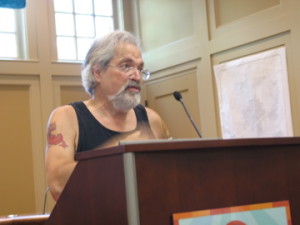 Skip Williamson was one of the original underground comic artists.
Skip Williamson was one of the original underground comic artists.